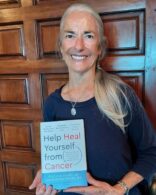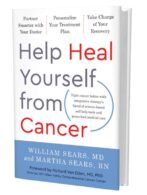 In August 2020, I (Martha Sears) was diagnosed with Stage 3A breast cancer. On September 30, 2020, I underwent a total right mastectomy including removal of all 14 axillary lymph nodes. Now, since the month of October is Breast Cancer Awareness Month, and our newest book, Help Heal Yourself from Cancer, was published earlier this month, I wanted to share my experience in this interview-style blog. A special “thank you” to our daughter Erin for the questions to help me process everything.
In August 2020, I (Martha Sears) was diagnosed with Stage 3A breast cancer. On September 30, 2020, I underwent a total right mastectomy including removal of all 14 axillary lymph nodes. Now, since the month of October is Breast Cancer Awareness Month, and our newest book, Help Heal Yourself from Cancer, was published earlier this month, I wanted to share my experience in this interview-style blog. A special “thank you” to our daughter Erin for the questions to help me process everything.
What was the best advice given to you and what advice would you give to other newly diagnosed women?
My best advice came from a friend who is a gynecological surgeon. A few days into my diagnosis, after my husband and I researched the best hospital and best cancer surgeon for me, we called this friend and told her the situation. Most importantly, she listened first. After listening for a half hour, she helped me make even more sense of what was ahead. Her words to me: “You’ve got this!” This simple phrase often replayed in my head throughout the next several months, helping me keep up my self-confidence.
My best advice to someone (after listening to her talk) would be the same: You’ve got this!
What helped you process the news?
Knowing other women, some close friends, who were dealing well and openly with breast cancer helped me process the news without falling into fear. Having “fear” not be an option enabled me to practice “faith over fear”. And since this was happening during the early months of COVID, I had already been exercising that attitude. Because of this, honestly, my first thought when the pathologist called me with the diagnosis of the biopsy was, “This will be interesting!” Eagerness to learn clicked in.
We remember you having such a peaceful spirit when you told us the news. How did you find peace?
Well, before telling my family the news, I first had to tell my husband. We had been there before with his two cancer diagnoses, and now it was time to tell him it was “my turn”. I simply sat down next to him and gave him the news, “I have cancer”. I remember watching his face to see how he would take it. I wanted to be sure he would not freak out. He didn’t. (He told me later he had been happy to see how I seemed so peaceful.)
Telling our daughters before I told the whole family was important to me. I wanted to model to them how peace would be a huge part of the journey unfolding before me, despite a lot of “what-ifs”. I wanted to have all us women together, so I said, “Let’s all have tea together… we never do that!” But it turned out that our youngest one wasn’t buying my casual invite. She could tell something was up, and shared over the phone that hearing this news was her worst fear. No one wants to hear that her mom has breast cancer!
I found peace because I have learned that all things work together for good (see the verse from Scripture, Romans 8:28). I wanted to protect them and myself from negative thinking and from seeing myself as a victim. In fact, that advice (“Don’t see yourself as a victim”) was the first thing I spotted in a manual on breast cancer that the hospital gave to women coming into their care. But I also didn’t want them think I was just faking it. So, I focused on presenting a “one day at a time” approach. At first, I really was assuming I would just need a lumpectomy so that’s what I told them. Don’t borrow trouble, right? Think of the best-case scenario rather than the worse-case scenario. This was the best way I could think of to protect myself from free-floating fear and wind up catching that fear myself.
What was the biggest challenges you had to overcome?
My biggest challenge, as the more detailed diagnosis came showing I would need a mastectomy not just a lumpectomy, was to avoid thinking of my body as somehow failing me. My breasts have served me well over the many years of being a breastfeeding mother, and now suddenly I would be losing my right breast. I shifted to a mindset of “good riddance” to the tumor and to not dwell on “if only”. Reality check.
Another part of this challenge was to not get into the blame game. Three years earlier, I had found a lump in this same breast and was very relieved when the ultrasound showed it was only a cyst. So as this “cyst” seemed to get larger over time I didn’t think much of it. Two more annual mammograms didn’t pick up on it either. I do have what’s called extra-dense breast tissue and this causes mammograms to miss things, so I was having a more specific type of mammogram. I could have gotten stuck with “if only…” and could have wound up blaming that doctor who said “cyst”. Or I could have blamed myself for being so nonchalant about the lump getting larger. But my medical oncologist walked me back off that ledge. When I asked him, “Why didn’t I catch this growth sooner?” he said helped me see that I could choose to be grateful that this didn’t happen when our kids were younger and needed me more. I realized he was giving me wise advice: See this as being the right time in your life to be facing this challenge.
What has this experience taught you?
This experience has taught me to see myself as a survivor rather than as a victim. I don’t think I would have thought that way before. When these serious health challenges come up, it reminds me how important it has been for our family to be so focused on healthy eating/living. Dr. Bill often speaks on this topic which he calls preloading. Don’t wait until you are facing health issues to start good nutrition habits, start now! So that when serious health challenges do arise, your body will be preloaded to be better able to heal through it. On a related note, here’s another blame game to avoid when you receive a cancer diagnosis: Don’t fall into the attitude of blaming yourself, like “Oh if only I had eaten healthier…” There are so many factors outside of our control, such as genetics, that contribute to a person’s chance of getting cancer. So why not focus on what you can control? And good health/nutrition habits certainly can prevent a lot, and will make your body healthier and stronger so you can better handle any health challenges that eventually come your way.
A more clinical lesson I learned from this is what my GYN friend told me as she finished up listening to me as I described above. Her rule of thumb with postmenopausal women who have an ultrasound showing a lump to be “only a cyst” is to INSIST on having that cyst biopsied. If I had known that three years earlier maybe I would have only needed a lumpectomy. But I know not to look back and wonder. And I now know to tell women who are postmenopausal to INSIST on having a cyst biopsied!
One more thing my GYN friend told me much later, at a meeting of our local chapter of the Catholic Medical Association: Getting a cancer diagnosis is like getting a postcard from God. That is certainly thought provoking, and it is not intended to be cavalier. And from her I have also learned to be a good listener!
What is your current status with the cancer?
Now two years after my surgery (followed by an eight-week course of radiation), I am happy to say there have been no more signs of cancer in my body! I am on a five-year course of hormone inhibitor, since my tumor was positive for both progesterone and estrogen. Thankfully, in my case chemotherapy was not indicated (in our book, see below, we discuss in-depth how to talk with your doctor about the various tests you can do to help determine the right treatment plan).
You and Dr. Bill just came out with a new book, Help Heal Yourself from Cancer. That’s amazing, congratulations! Tell us about the motivation behind this book. Where can people find it?
Bill had already been writing a book about cancer when I got this diagnosis, so I instantly became a co-author. He wanted me to be a part of it since breast cancer is one of the four most common cancers, so I was glad to share a lot of what I learned through my healing journey. We have had a significant number of cancers in our family, starting with his colorectal cancer 25 years ago. That one hit us hard because, as we tell in the book, both my husband’s father (at age 75) and my mother (at age 52) had this same colorectal cancer, and they both died from it. In fact, when my husband received that diagnosis, I had a very unhelpful reaction: FEAR. I really thought I would lose him to this cancer, as our experience seemed to indicate. It took me three days to come out from under that mindset, that fear cloud. He later told me that is how it was for him too.
Along with my husband’s colorectal cancer our family has also experienced bone, brain, and blood cancer, and then finally my breast cancer. That’s a lot of learning! So, it became important for us to write a book that would be helpful to people in ways that we discovered made a difference for us, to be able to share some things we did not find in other cancer books. As with all of our books, we share our experiences with the hope of helping people. If this book can help just one person have a better experience healing from cancer, we will have reached our goal.
Help Heal Yourself from Cancer is now available in hardcover, eBook, and audiobook versions from most book retailers, including:
All author proceeds from book sales will benefit children’s charities.
Additional helpful resources to go along with the book can be found here.

